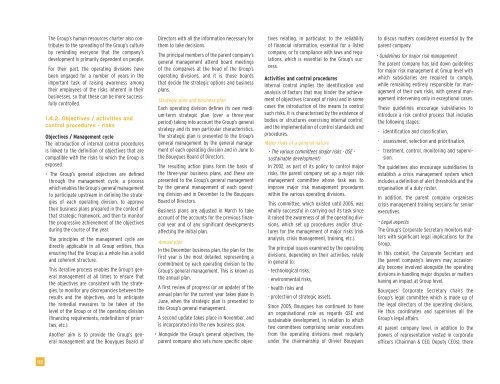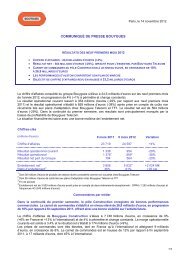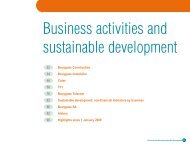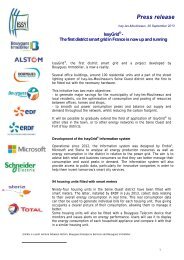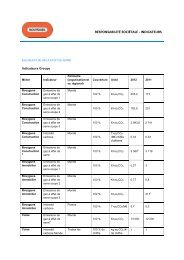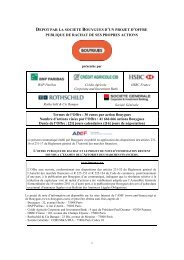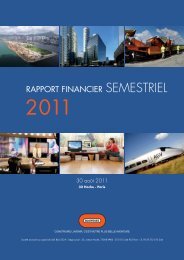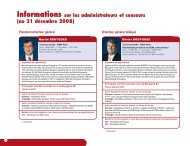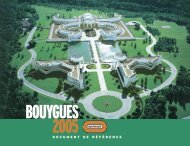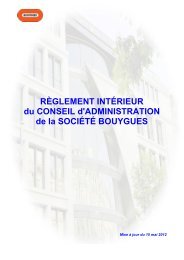A N N U A L R E P O R T - Bouygues
A N N U A L R E P O R T - Bouygues
A N N U A L R E P O R T - Bouygues
You also want an ePaper? Increase the reach of your titles
YUMPU automatically turns print PDFs into web optimized ePapers that Google loves.
The Group’s human resources charter also contributes<br />
to the spreading of the Group’s culture<br />
by reminding everyone that the company’s<br />
development is primarily dependent on people.<br />
For their part, the operating divisions have<br />
been engaged for a number of years in the<br />
important task of raising awareness among<br />
their employees of the risks inherent in their<br />
businesses, so that these can be more successfully<br />
controlled.<br />
1.4.2. Objectives / activities and<br />
control procedures - risks<br />
Objectives / Management cycle<br />
The introduction of internal control procedures<br />
is linked to the definition of objectives that are<br />
compatible with the risks to which the Group is<br />
exposed.<br />
• The Group’s general objectives are defined<br />
through the management cycle, a process<br />
which enables the Group’s general management<br />
to participate upstream in defining the strategies<br />
of each operating division, to approve<br />
their business plans prepared in the context of<br />
that strategic framework, and then to monitor<br />
the progressive achievement of the objectives<br />
during the course of the year.<br />
The principles of the management cycle are<br />
directly applicable in all Group entities, thus<br />
ensuring that the Group as a whole has a solid<br />
and coherent structure.<br />
This iterative process enables the Group’s general<br />
management at all times to ensure that<br />
the objectives are consistent with the strategies,<br />
to monitor any discrepancies between the<br />
results and the objectives, and to anticipate<br />
the remedial measures to be taken at the<br />
level of the Group or of the operating division<br />
(financing requirements, redefinition of priorities,<br />
etc.).<br />
Another aim is to provide the Group’s general<br />
management and the <strong>Bouygues</strong> Board of<br />
Directors with all the information necessary for<br />
them to take decisions.<br />
The principal members of the parent company’s<br />
general management attend board meetings<br />
of the companies at the head of the Group’s<br />
operating divisions, and it is those boards<br />
that decide the strategic options and business<br />
plans.<br />
Strategic plan and business plan<br />
Each operating division defines its own medium-term<br />
strategic plan (over a three-year<br />
period) taking into account the Group’s general<br />
strategy and its own particular characteristics.<br />
The strategic plan is presented to the Group’s<br />
general management by the general management<br />
of each operating division and in June to<br />
the <strong>Bouygues</strong> Board of Directors.<br />
The resulting action plans form the basis of<br />
the three-year business plans, and these are<br />
presented to the Group’s general management<br />
by the general management of each operating<br />
division and in December to the <strong>Bouygues</strong><br />
Board of Directors.<br />
Business plans are adjusted in March to take<br />
account of the accounts for the previous financial<br />
year and of any significant developments<br />
affecting the initial plan.<br />
Annual plan<br />
In the December business plan, the plan for the<br />
first year is the most detailed, representing a<br />
commitment by each operating division to the<br />
Group’s general management. This is known as<br />
the annual plan.<br />
A first review of progress (or an update) of the<br />
annual plan for the current year takes place in<br />
June, when the strategic plan is presented to<br />
the Group’s general management.<br />
A second update takes place in November, and<br />
is incorporated into the new business plan.<br />
• Alongside the Group’s general objectives, the<br />
parent company also sets more specific objectives<br />
relating, in particular, to the reliability<br />
of financial information, essential for a listed<br />
company, or to compliance with laws and regulations,<br />
which is essential to the Group’s success.<br />
Activities and control procedures<br />
Internal control implies the identification and<br />
analysis of factors that may hinder the achievement<br />
of objectives (concept of risks) and in some<br />
cases the introduction of the means to control<br />
such risks. It is characterised by the existence of<br />
bodies or structures exercising internal control,<br />
and the implementation of control standards and<br />
procedures.<br />
Major risks of a general nature<br />
• The various committees (major risks - QSE -<br />
sustainable development)<br />
In 2002, as part of its policy to control major<br />
risks, the parent company set up a major risk<br />
management committee whose task was to<br />
improve major risk management procedures<br />
within the various operating divisions.<br />
This committee, which existed until 2005, was<br />
wholly successful in carrying out its task since<br />
it raised the awareness of all the operating divisions,<br />
which set up procedures and/or structures<br />
for the management of major risks (risk<br />
analysis, crisis management, training, etc.).<br />
The principal issues examined by the operating<br />
divisions, depending on their activities, relate<br />
in general to:<br />
- technological risks,<br />
- environmental risks,<br />
- health risks and<br />
- protection of strategic assets.<br />
Since 2005, <strong>Bouygues</strong> has continued to have<br />
an organisational role as regards QSE and<br />
sustainable development, in relation to which<br />
two committees comprising senior executives<br />
from the operating divisions meet regularly<br />
under the chairmanship of Olivier <strong>Bouygues</strong><br />
to discus matters considered essential by the<br />
parent company.<br />
• Guidelines for major risk management<br />
The parent company has laid down guidelines<br />
for major risk management at Group level with<br />
which subsidiaries are required to comply,<br />
while remaining entirely responsible for management<br />
of their own risks, with general management<br />
intervening only in exceptional cases.<br />
These guidelines encourage subsidiaries to<br />
introduce a risk control process that includes<br />
the following stages:<br />
- identification and classification,<br />
- assessment, selection and prioritisation,<br />
- treatment, control, monitoring and supervision.<br />
The guidelines also encourage subsidiaries to<br />
establish a crisis management system which<br />
includes a definition of alert thresholds and the<br />
organisation of a duty roster.<br />
In addition, the parent company organises<br />
crisis management training sessions for senior<br />
executives.<br />
• Legal aspects<br />
The Group’s Corporate Secretary monitors matters<br />
with significant legal implications for the<br />
Group.<br />
In this context, the Corporate Secretary and<br />
the parent company’s lawyers may occasionally<br />
become involved alongside the operating<br />
divisions in handling major disputes or matters<br />
having an impact at Group level.<br />
<strong>Bouygues</strong>’ Corporate Secretary chairs the<br />
Group’s legal committee which is made up of<br />
the legal directors of the operating divisions.<br />
He thus coordinates and supervises all the<br />
Group’s legal affairs.<br />
At parent company level, in addition to the<br />
powers of representation vested in corporate<br />
officers (Chairman & CEO, Deputy CEOs), there<br />
122


